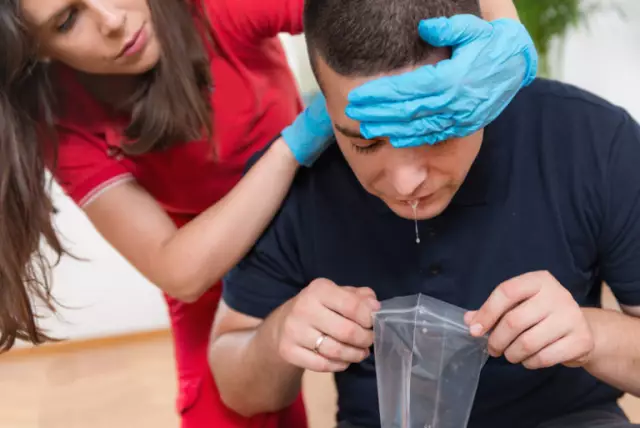- Author Rachel Wainwright wainwright@abchealthonline.com.
- Public 2023-12-15 07:39.
- Last modified 2025-11-02 20:14.
Wolfberry poisoning
Wolfberry (wolfberry, daphne, wolf bast) is a low-growing shrub no more than one meter high. It grows in the Caucasus, Siberia, as well as forests and forest-steppes of the European part of Russia. Wolf berries begin to ripen from mid-July. They have a deep red color and are located on the branches in dense clusters.

Source: depositphotos.com
How does wolf berry poisoning occur?
Most often, children become victims of poisoning, who are attracted by the bright color of the berries. Their taste is pungent and pungent, so it is impossible to eat a lot of them. But even 8-10 berries can cause severe poisoning in a child, due to the high content of daphrin glycoside and meserine resin in wolf berries.
Mezirin resin is irritating, causing redness, swelling and burns of the skin and mucous membranes. The ingress of this toxin into the digestive tract leads to the development of gastroenteric syndrome.
Dafrin glycoside negatively affects the blood coagulation system, causing increased bleeding.
Poisoning symptoms
For poisoning with wolf berries, it is characteristic:
- severe burning of the mucous membranes of the mouth and nasal cavity;
- swallowing disorder;
- hypersalivation;
- pain in the epigastric region;
- conjunctivitis;
- vomiting;
- diarrhea.
If the victim is not provided with urgent assistance, he develops hemorrhagic gastroenteritis, as evidenced by the appearance of an admixture of blood in the feces and vomit.
In severe poisoning, the victim develops a convulsive syndrome, and general weakness increases. Against the background of an increase in respiratory and cardiovascular insufficiency, a lethal outcome can occur.
The juice of wolf berries that gets on the skin is also dangerous. At the point of contact, a sharp burning pain occurs, redness and blisters appear. The poison is able to be absorbed through the skin, its penetration into the vascular bed leads to the appearance of convulsions and respiratory distress in the patient.

Source: depositphotos.com
First aid for wolf berry poisoning
First aid for poisoning with wolf berries should be provided immediately. It is aimed at reducing the severity of symptoms of poisoning and protecting the mucous membranes of the digestive tract from further exposure to toxins.
- Flush the stomach. The patient is given at least ½ liter of warm water to drink, after which artificial vomiting is induced by irritation of the root of the tongue. This procedure is repeated several times, until the vomit contains nothing but water. It is impossible to wash the stomach in this way for young children and people who are unconscious.
- Give milk and still mineral water to drink in large quantities.
- To reduce pain in the oral cavity, the patient can be given Almagel A, which contains anesthesin. If this drug is not available, it can be replaced with slimy rice water, a mixture of two egg whites with a glass of cold water, or jelly. The absorption of small pieces of ice also helps to relieve pain in the mouth.
- With severe cramping abdominal pain, take one tablet of any antispasmodic drug (Papaverin, No-shpa).
In case of poisoning with wolf berries, laxatives are categorically contraindicated to the patient. Also, non-steroidal anti-inflammatory drugs (especially Aspirin) are prohibited, since they have the ability to reduce blood clotting time, thereby increasing the symptoms of hemorrhagic gastroenteritis.
If the juice of wolf berries gets on the skin, the affected area should be washed with a large volume of 2% baking soda solution or running water. After that, the surface of the skin is lubricated with a 1-2% solution of lidocaine, which will reduce pain and burning.
When medical attention is required
In case of poisoning with wolf berries, it is necessary to seek medical help as soon as possible: you should first call an ambulance, and only then proceed to provide first aid to the victim.
Treatment of intoxication caused by wolf berries is carried out in a hospital, in the department of toxicology. There is no specific antidote for this type of poisoning, therefore symptomatic treatment is carried out. Antispasmodics are prescribed to relieve spasm of smooth muscles of the gastrointestinal tract. If necessary, intensive therapy for hemorrhagic syndrome is carried out.
Possible consequences
Wolfberry poisoning can cause severe gastrointestinal bleeding, which will require blood transfusion (blood transfusion) to treat.
With a significant amount of toxins from wolf berries that have entered the body, intoxication can be very severe and cause death.
Prevention
For the prevention of wolf berry poisoning, it is important to carry out regular sanitary and educational work with the population. When going out into nature with children, adults should control them, as well as explain the rules of safe behavior in the forest, in particular, a firm ban on the use of any berries without the knowledge of adults.

Elena Minkina Doctor anesthesiologist-resuscitator About the author
Education: graduated from the Tashkent State Medical Institute, specializing in general medicine in 1991. Repeatedly passed refresher courses.
Work experience: anesthesiologist-resuscitator of the city maternity complex, resuscitator of the hemodialysis department.
The information is generalized and provided for informational purposes only. At the first sign of illness, see your doctor. Self-medication is hazardous to health!






